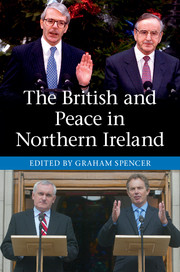Book contents
- Frontmatter
- Dedication
- Contents
- Notes on contributors
- Acknowledgements
- Brief chronology of the peace process
- Abbreviations
- Key documents
- Introduction
- 1 The terrain of discourse
- 2 The Anglo-Irish Agreement: an interview with Sir David Goodall and Lord Armstrong of Ilminster
- 3 The constitutional issue in Irish politics
- 4 Negotiations and positions: an interview with Sir John Chilcot
- 5 Resolving intercommunal conflict: some enabling factors
- 6 Tactics, strategy and space
- 7 The Joint Declaration and memory
- 8 Movement and transition in 1997: Major to Blair
- 9 The challenge of symmetry in dialogue: an interview with Sir Joseph Pilling
- 10 Why was the Good Friday Agreement so hard to implement?: lessons from ‘Groundhog Day’, 1998–2002
- 11 Text and context: an interview with William Fittall
- 12 The nature of dialogue: an interview with Sir Jonathan Phillips
- 13 Managing the tensions of difference: an interview with Jonathan Powell
- Conclusion
- Index
6 - Tactics, strategy and space
Published online by Cambridge University Press: 05 March 2015
- Frontmatter
- Dedication
- Contents
- Notes on contributors
- Acknowledgements
- Brief chronology of the peace process
- Abbreviations
- Key documents
- Introduction
- 1 The terrain of discourse
- 2 The Anglo-Irish Agreement: an interview with Sir David Goodall and Lord Armstrong of Ilminster
- 3 The constitutional issue in Irish politics
- 4 Negotiations and positions: an interview with Sir John Chilcot
- 5 Resolving intercommunal conflict: some enabling factors
- 6 Tactics, strategy and space
- 7 The Joint Declaration and memory
- 8 Movement and transition in 1997: Major to Blair
- 9 The challenge of symmetry in dialogue: an interview with Sir Joseph Pilling
- 10 Why was the Good Friday Agreement so hard to implement?: lessons from ‘Groundhog Day’, 1998–2002
- 11 Text and context: an interview with William Fittall
- 12 The nature of dialogue: an interview with Sir Jonathan Phillips
- 13 Managing the tensions of difference: an interview with Jonathan Powell
- Conclusion
- Index
Summary
In this chapter I will examine some of the practical steps that were taken to promote and consolidate the British and Irish governments’ shared objective of inclusiveness in the Northern Ireland political/peace process. I will do so from the perspective of someone who was personally involved in many of the more obscure aspects of the search to find a viable accommodation. At the beginning of that phase, 1990–2, persuading the ‘constitutional’ parties to engage with each other and the two governments was paramount. That persuasion included dialogue between ministers, officials and members of those parties, particularly the unionist parties, ranging from grass-roots supporters, party officers and district councillors to MPs and other senior figures. It also involved dialogue with non-political ‘opinion formers’, such as church, business and trades union leaders, and community activists. There was no general understanding that ultimately a comprehensive, durable settlement would be achieved only with the participation of the political representatives of militant republicanism – (principally Sinn Féin) – and militant loyalism – principally the Progressive Unionist Party (PUP) and the Ulster Democratic Party (UDP) – but as events unfolded that would change. I will look at how the consequences of the changed circumstances were addressed so that following paramilitary ceasefires those groups were able to join the process as equal partners, before considering how dialogue with associates of the residual (and small but dangerous) republican and loyalist paramilitary groups that had not been present at the talks was established and maintained after the Belfast Agreement in 1998 and consequent devolution. And how the representatives of the PUP and the UDP, who had garnered little electoral advantage in the resultant elections, were encouraged to develop mechanisms and strategies that would allow them to put their creativity and energy at the disposal of their communities.
- Type
- Chapter
- Information
- The British and Peace in Northern IrelandThe Process and Practice of Reaching Agreement, pp. 120 - 146Publisher: Cambridge University PressPrint publication year: 2015
- 1
- Cited by



